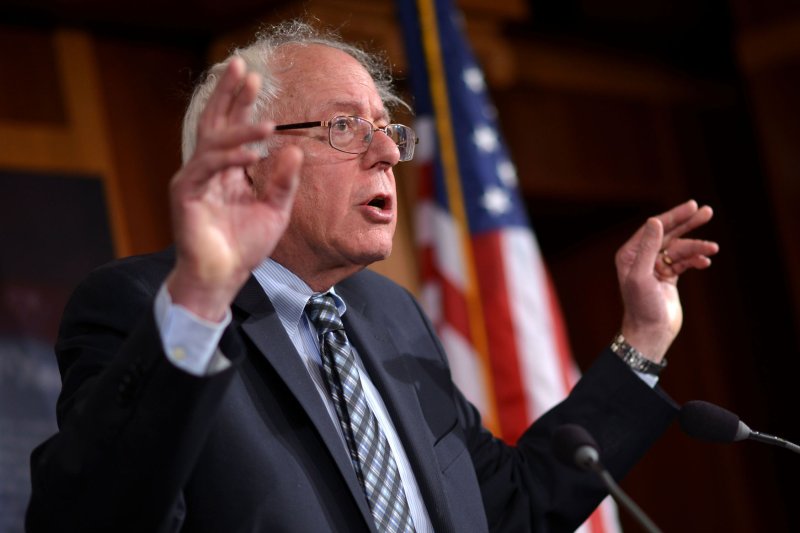Sen. Bernie Sanders (I-VT) introduced legislation on Wednesday, May 6, 2015, intended to break up and reorganize any U.S. bank that is found to wield too much power and influence over the U.S. economy. The bill is aimed at preventing such banks from bringing down the economy in the future if they fail. Photo: UPI/Kevin Dietsch |
License Photo
WASHINGTON, May 6 (UPI) -- Sen. Bernie Sanders, I-Vt., on Wednesday presented legislation intended to break up the nation's largest and most powerful banks so that a financial crisis like the one in 2008 can never happen again.
The bill, which is accompanied by a companion bill in the House, seeks to unconsolidate what Sanders views as too much money and too much influence.
"No single financial institution should have holdings so extensive that its failure could send the world economy into crisis," Sanders said in a statement on his website Wednesday. "If an institution is too big to fail, it is too big to exist."
The legislation is called the "Too Big to Fail, Too Big to Exist Act," and any bank that is determined "too big to fail" will be broken up and reorganized to mitigate potential for future economic damage.
Sanders says the biggest banks in the United States are 80 percent larger than they were at the time of the mortgage market-led crisis in late 2008 -- which ultimately led Congress to provide a $700 billion taxpayer-funded bailout. And, he says, that is simply way too much economic vulnerability for one bank to have.
In addition to the bailout, the Federal Reserve provided $16 trillion in near zero interest loans. The crisis had a devastating impact on the economy, which was slung into a recession for years that followed.
Sanders' bill gives banking regulators 90 days to identify banks in the United States whose failure could trigger an economic catastrophe. The companion bill, drafted by Rep. Brad Sherman, D-Calif., also makes the same request.
"Never again should a financial institution be able to demand a federal bailout," Sherman said. "They claim; 'If we go down, the economy is going down with us,' but by breaking up these institutions long before they face a crisis, we ensure a healthy financial system where medium-sized institutions can compete in the free market."
That list is expected to include Bank of America, Bank of New York Mellon, Citigroup, Goldman Sachs, JPMorgan Chase, Morgan Stanley, State Street and Wells Fargo.
Some analysts believe Sanders' bill has little chance of passing, noting that he previously tried to pass similar legislation and failed.
One estimate indicated the recession cost $14 trillion, doubled the national debt, and cost more than President George W. Bush's tax cuts and the wars in Iraq and Afghanistan combined, Sanders' office said.
The six largest U.S. banks, the senator's office noted, combine for $10 trillion in assets -- which is roughly 60 percent of the gross national product. That means any one of the bank's failures has the potential to heavily impact not only the U.S. economy, but the global financial well being.
Sanders, an Independent, last week declared his intention to run for president in 2016 on the Democratic ticket, where he joined former senator and Secretary of State Hillary Clinton in the race.















